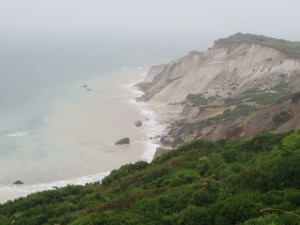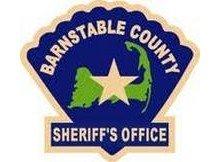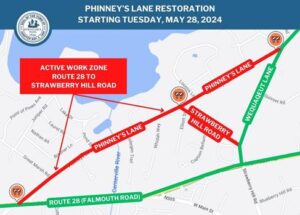 AQUINNAH – The Supreme Judicial Court has ruled that the owners of several undeveloped landlocked parcels of land off Moshup Trail in Aquinnah have no easement rights to access their property.
AQUINNAH – The Supreme Judicial Court has ruled that the owners of several undeveloped landlocked parcels of land off Moshup Trail in Aquinnah have no easement rights to access their property.
The land owners claimed, in part, that Native American customs allowed them “easements by necessity” that were created in an 1878 partition of the land.
But the state’s highest court ruled that the defendants, which included the Town of Aquinnah, presented sufficient evidence to rebut the presumption that the initial land division intended to include rights of access.
The case has been moving through the courts for two decades. The owners who brought the action are James Decoulos and his wife, Maria Kitras.
The landmark ruling has far-reaching implications for undeveloped parcels that don’t have existing access.
The land owners attempted to argue that there was a presumed intent that the grantees of the land in the late 1800’s had legal access to their lots.
In the unanimous court ruling, Justice Francis Spina said the case presented a “unique set of facts in which we must examine a large-scale partition of Native American common land that occurred over 100 years ago.”
The challenge, according to the court, was to ascertain the intent of the parties.
Justice Spina, in his ruling, presented a detailed historical account of the 19th Century guardianship system that managed the Native American Tribes.
Those tribes were designated “involuntary wards of the State,” where they could not sue of be sued, enter into legally binding contracts, or sell land to people outside of their own tribe.
That practice slowly changed in the mid-19th Century as the Legislature moved toward granting Native Americans full citizenship.
Commissioners and committees were established to visit the tribes and assess their condition, their way of life and whether citizenship would be in their best interest.
Among tribal customs in Aquinnah at the time was one that allowed each member access, as necessary, across the common land and lands “held in severalty.”
Under a plan to divide parcels among members of the tribe in 1878, more than 500 lots were created. According to the court, not one lot included an express easement of access. As a result, the majority of lots divided from common land were landlocked.
The commissioners expressly included a right of access over three lots to a creek for the purpose of fishing.
At the time, there was an existing road that provided access from the Gay Head Lighthouse to Chilmark. But the court found that the lots in question in the lawsuit did not abut that road.
The court also ruled that no other lots, including the Moshup Trail that was created after the division of land, abutted the lots in question.
An implied easement, which is the legal theory the plaintiffs relied upon, is founded on the idea that it was the purpose of the parties that the conveyance would be beneficial to the grantee, even if not expressed in the document creating the lot division.
The SJC relied on case law that said there is no public policy that creates an easement by necessity to make land accessible.
Justice Spina wrote, “It is a purchaser’s ‘own folly’ that he purchased land that had no access with a way over his land, for his convenience.”
Spina said the party claiming the easement by necessity has the burden of establishing that the parties intended to create an easement that it had not expressed in the deed.
The court said that after examining the 1878 partition and information known to the commissioners at the time of the partition, no such intention existed.
The ruling also said there was no record in the Legislature of an intention to create access rights for the purpose of dividing the common lands into “salable property.”
Had the SJC ruled otherwise, it could have opened up dozens of landlocked parcels on Martha’s Vineyard for further development.
The court also relied on the division of common land by the Chappaquiddick Tribe in its ruling.
Justice Spina said the commissioners who partitioned that land included in their deeds “express rights of access to roads.”
Spina said it was likely the commissioners of the Gay Head partition were well aware of the division of common land at Chappaquiddick and the express rights of access included in that arrangement.
The court further said the evidence suggested a finding that the absence of access easements in the conveyance flowing from the Gay Head partitions were intentional, thereby rebutting the presumption of easements by necessity.
By MATT PITTA, CapeCod.com News Director
























Speak Your Mind